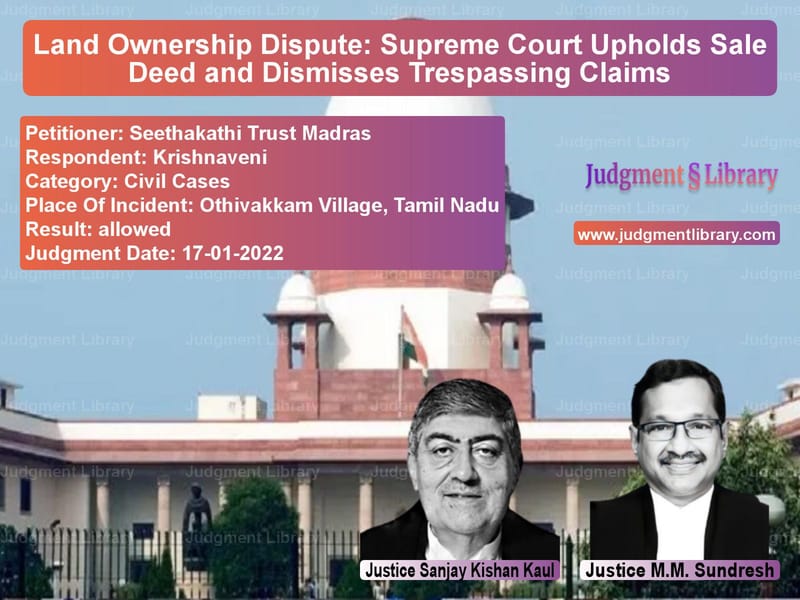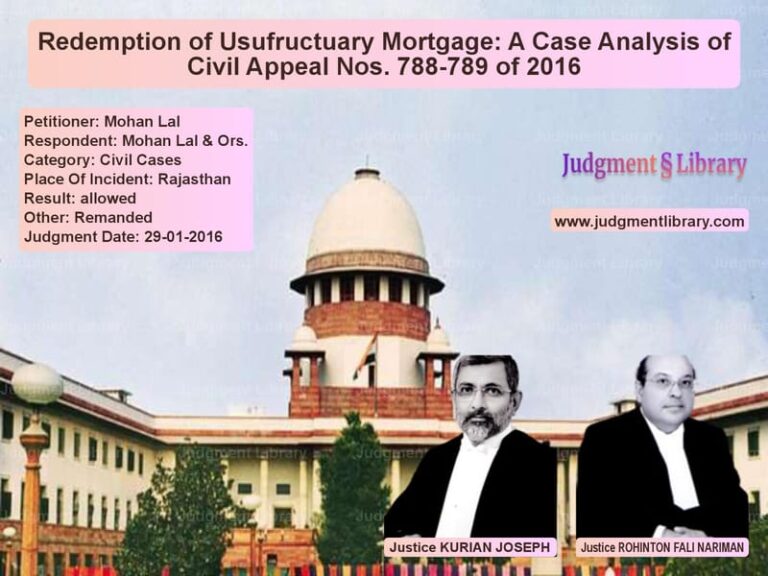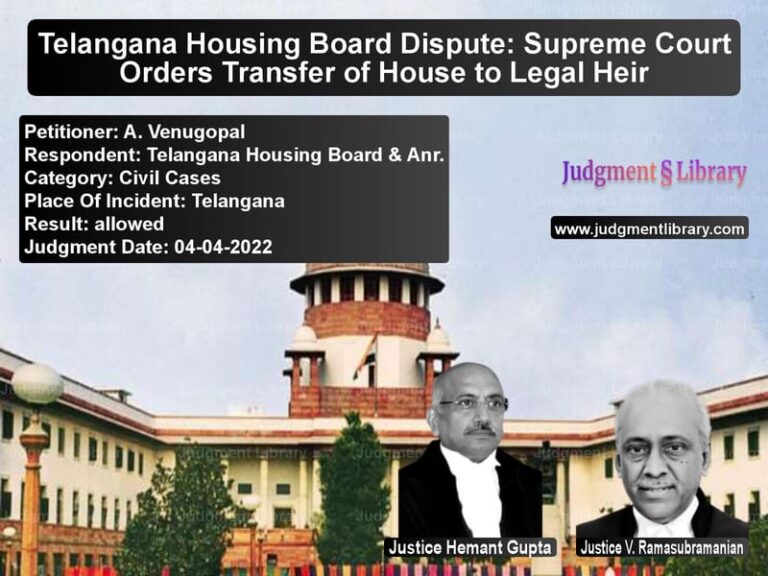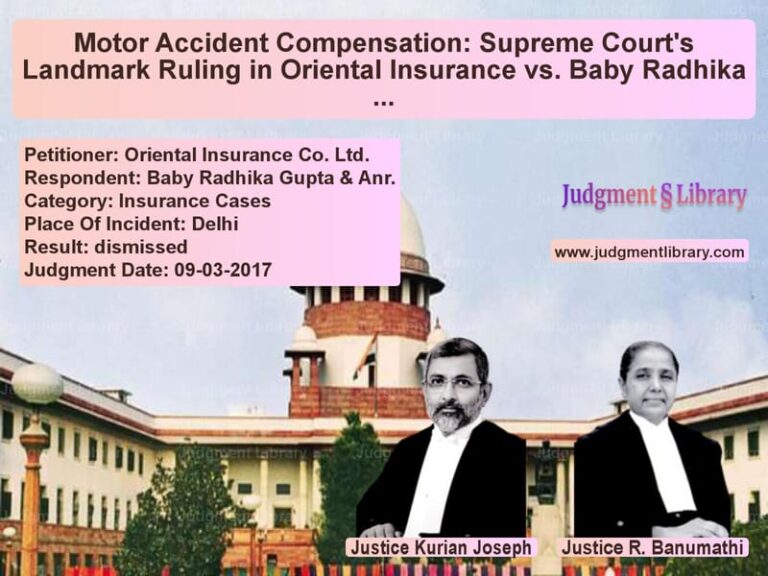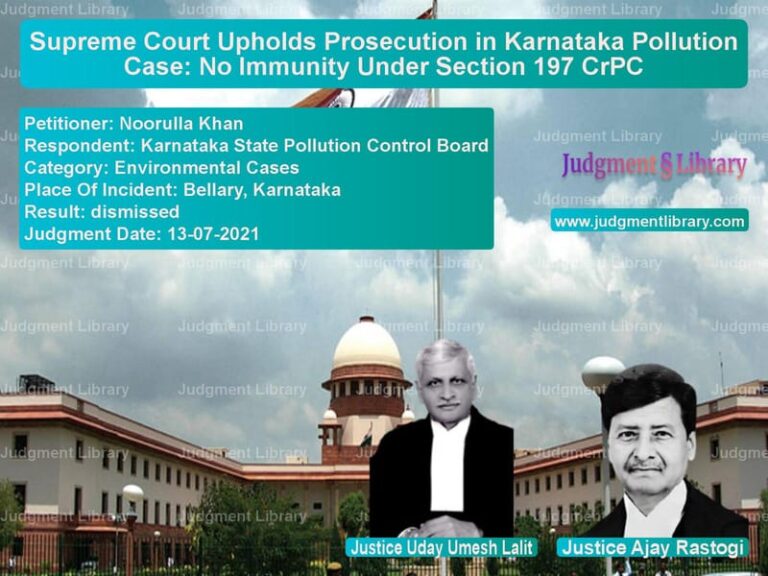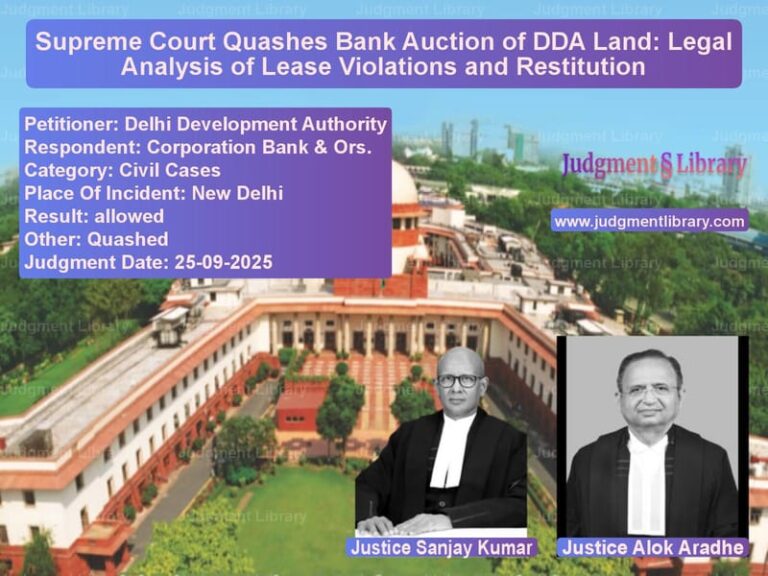Land Ownership Dispute: Supreme Court Upholds Sale Deed and Dismisses Trespassing Claims
The Supreme Court of India recently adjudicated a decades-old property dispute in the case of Seethakathi Trust Madras vs. Krishnaveni. The dispute, spanning over 50 years, revolved around the ownership and possession of a small parcel of land measuring 0.08 cents in Othivakkam Village, Tamil Nadu. The Court ultimately upheld the sale deed in favor of the appellant and dismissed the respondent’s claim of trespassing.
Background of the Case
The origin of the dispute dates back to 1959, when C.D. Veeraraghavan Mudaliar, the original landowner, entered into an agreement to sell 120 acres to Janab Sathak Abdul Khadar Sahib on behalf of Seethakathi Trust. However, the respondent, Krishnaveni, claimed that Mudaliar had also entered into a separate agreement with her in 1961 to sell 50 acres of the same land.
The appellant Trust purchased 50 acres through multiple transactions, culminating in a registered sale deed in 1968. The remaining 70 acres were also acquired by the Trust in the same year, leaving no dispute over this portion of land. The crux of the dispute centered around 0.08 cents, which the respondent alleged was encroached upon by the Trust.
Key Legal Issues
- Was the respondent entitled to claim ownership over the disputed land?
- Did the appellant Trust acquire legal ownership through a valid sale deed?
- Did the respondent successfully prove possession?
- Did the High Court err in reversing the concurrent findings of the lower courts?
Arguments by the Appellant (Seethakathi Trust)
The appellant, represented by Senior Advocate C.S. Vaidyanathan, argued:
- The respondent failed to establish a valid sale agreement over the disputed land.
- The Trust lawfully acquired 120 acres through multiple registered sale deeds, which were never challenged by the respondent.
- The respondent did not take possession as per the execution proceedings of her specific performance decree.
- The lower courts had correctly ruled against the respondent based on documentary and witness evidence.
Arguments by the Respondent (Krishnaveni)
The respondent, represented by Advocate M. Ramesh, countered that:
- She was the rightful owner of 50 acres through a sale agreement executed in 1961.
- The Trust had illegally trespassed upon 0.08 cents of her land.
- The execution court had granted her possession, but the Trust obstructed her access.
- The High Court correctly intervened and reversed the lower court decisions.
Supreme Court’s Observations
The Supreme Court, comprising Justice Sanjay Kishan Kaul and Justice M.M. Sundresh, examined the records and found inconsistencies in the respondent’s claims. The Court held:
“The manner in which the decree for specific performance was obtained raises serious doubts, as the actual sale was made in favor of a third party long before the suit was filed.”
“The respondent did not even enter the witness box to support her claims, which is a significant lapse in proving possession.”
“The Trust has been in continuous possession of the land for over 30 years, and the respondent failed to challenge the Trust’s ownership effectively.”
Key Legal Findings
- Registered Sale Deed Prevails: The Court reaffirmed that a registered sale deed establishes ownership unless challenged within a reasonable period.
- Adverse Possession: The appellant Trust was found to be in continuous possession, further weakening the respondent’s claims.
- Lack of Evidence: The respondent failed to depose in court or provide concrete evidence of possession, which was fatal to her case.
Final Judgment
The Supreme Court ruled:
“The appeal is allowed. The impugned judgment of the High Court is set aside, and the suit filed by the respondent stands dismissed.”
Implications of the Judgment
This ruling has significant implications for property law and specific performance cases:
- Legal Sanctity of Sale Deeds: Registered sale deeds remain the strongest proof of ownership.
- Strict Scrutiny of Possession Claims: Mere paper possession is not sufficient to claim ownership.
- Role of Appellate Courts: High Courts should not disturb well-reasoned lower court rulings without strong justifications.
Conclusion
The Supreme Court’s decision upholds the principle that property transactions should be backed by clear, legally recognized documentation. The ruling ensures that dubious claims cannot override legally registered sales, providing clarity and security in real estate transactions.
Petitioner Name: Seethakathi Trust Madras.Respondent Name: Krishnaveni.Judgment By: Justice Sanjay Kishan Kaul, Justice M.M. Sundresh.Place Of Incident: Othivakkam Village, Tamil Nadu.Judgment Date: 17-01-2022.
Don’t miss out on the full details! Download the complete judgment in PDF format below and gain valuable insights instantly!
Download Judgment: seethakathi-trust-ma-vs-krishnaveni-supreme-court-of-india-judgment-dated-17-01-2022.pdf
Directly Download Judgment: Directly download this Judgment
See all petitions in Property Disputes
See all petitions in Specific Performance
See all petitions in Judgment by Sanjay Kishan Kaul
See all petitions in Judgment by M.M. Sundresh
See all petitions in allowed
See all petitions in supreme court of India judgments January 2022
See all petitions in 2022 judgments
See all posts in Civil Cases Category
See all allowed petitions in Civil Cases Category
See all Dismissed petitions in Civil Cases Category
See all partially allowed petitions in Civil Cases Category

